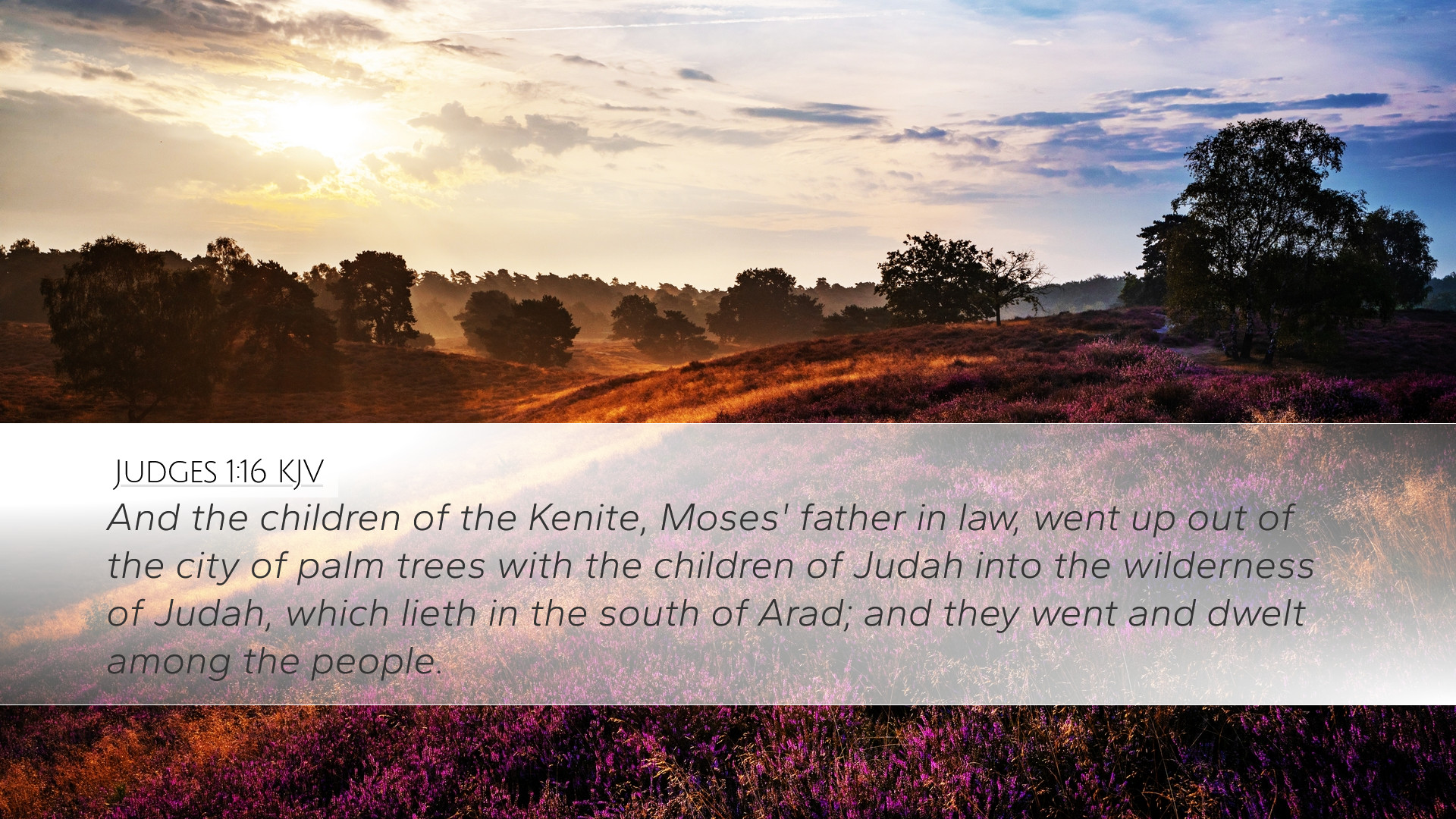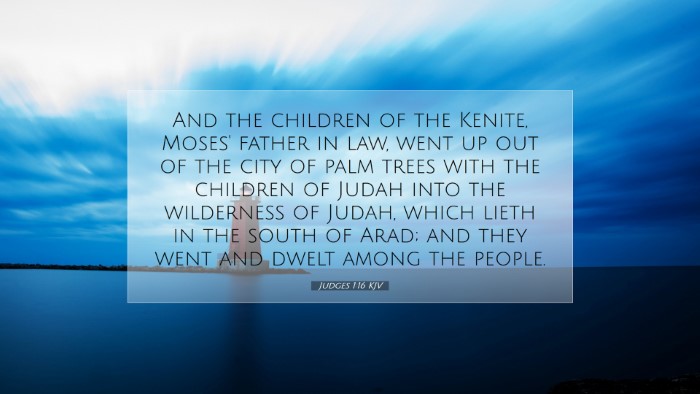Commentary on Judges 1:16
Bible Verse: Judges 1:16 (KJV): "And the children of the Kenite, Moses' father in law, went up out of the city of palm trees with the children of Judah into the wilderness of Judah, which lieth in the south of Arad; and they went and dwelt among the people."
Introduction
The Book of Judges presents a pivotal time in Israel's history, chronicling the cycles of apostasy, oppression, repentance, and deliverance experienced by the Israelites. Judges 1:16 highlights a significant migration of the Kenites, descendants of Moses' father-in-law, from the palm city to a wilderness region. This verse, albeit brief, opens up a wealth of theological and historical insights worthy of exploration.
Historical Context
The Kenites, who are first mentioned in the Torah, had a deep connection with Israel through Moses and his family. Their relocation into the wilderness of Judah signifies not only geographical movement but also their integration into the broader narrative of Israel's conquest and settlement in Canaan. Their journey accentuates God's guidance and providential involvement in the history of His people.
Theological Reflections
-
Divine Providence:
Understanding the movements of the Kenites as guided by divine providence helps illuminate God's overarching plan for His people. Matthew Henry notes that their journey demonstrates God's ability to integrate foreigners into His unfolding covenant, emphasizing inclusivity within His salvific design.
-
The Role of Migration:
Migration often serves as a theme in Scripture, symbolizing renewal and the search for promise. As the Kenites leave the city of palm trees—an oasis of comfort—they journey into a wilderness characterized by uncertainty yet filled with potential for growth and dependence on God. Albert Barnes remarks on this transition as reflective of our spiritual journeys, where stepping into the unknown can lead to deeper faith.
Character of the Kenites
Adam Clarke describes the Kenites as a significant but sometimes overlooked group in biblical history. Their close association with Israel raises questions about identity, loyalty, and the nature of community in faith. The Kenites exemplify a blending of cultures and worship, indicating that faith is not confined to ethnic boundaries but is open to all who seek to honor God.
Symbolic Meanings
-
Wilderness as a Place of Transformation:
The wilderness is often depicted in Scripture as a setting for spiritual breakthroughs. For the Kenites, transitioning into the wilderness of Judah not only signifies a physical relocation but also a metaphorical journey into trust and reliance upon God. This aligns with themes of transformation found throughout the biblical narrative.
-
Implication of Fellowship:
The Kenites' decision to dwell among the people of Judah implies a communal aspect of faith. Henry emphasizes that faith is lived out in community, urging readers to recognize the importance of communal ties in the journey of faith, especially during times of transition and upheaval.
Lessons for Today
Judges 1:16 imparts significant lessons relevant to contemporary readers and scholars. The responsive nature of both the Kenites and the children of Judah offers insights into how believers can navigate their journeys amid cultural shifts and personal challenges.
-
A Call to Inclusivity:
Just as the Kenites were welcomed into Judah, the church today must embody the spirit of inclusivity, welcoming those from various backgrounds who wish to share in the promise of God. The church can draw parallels and learn valuable lessons from the history of the Kenites.
-
The Value of Community:
As the Kenites found a new home among the people of Judah, modern Christians are reminded of the importance of community in their faith. Isolation often leads to spiritual stagnation, and believers are encouraged to foster relationships that provide support, accountability, and growth.
-
Faith and Migration:
Lastly, this passage calls to mind the omnipresent theme of migration in human experiences—representing not merely a physical movement but a profound existential journey toward promise and spiritual fulfillment. Those who move in faith often encounter transformative encounters that redefine their understanding of God and His purposes.
Conclusion
In conclusion, Judges 1:16 offers a rich tapestry of historical significance, theological depth, and practical application. Through careful examination of the Kenites and their journey, we uncover God's sovereign plan for His covenant people—a plan that encompasses all who acknowledge Him. This verse invites pastors, scholars, and students alike to reflect deeply on their stewardship of faith, their community ties, and their willingness to venture into the spiritual wilderness where God may be leading them.


